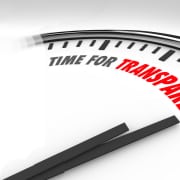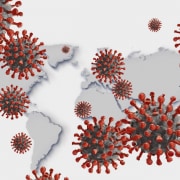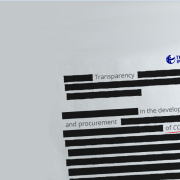|
Getting your Trinity Audio player ready...
|
UPDATE, June 2020: In a letter dated 15 June, the Zondo Commission replied to the Civil Society Working Group on State Capture to say that despite the strict lockdown regulations, the commission was able to do a substantial amount of work remotely in the weeks since the country shut down. The letter reiterated that hearings will start again on 29 June, with the revised format of limiting witnesses to oral evidence that is considered “very important”, while making the entire statement publicly available through other channels. The commission also addressed the issue of the interim report, and thanked and commended the civil society organisations for their continued support. Read the commission\s response.
The Civil Society Working Group on State Capture has written to Deputy Chief Justice Raymond Zondo, chairperson of the commission of inquiry into state capture, to request clear and frequent updates from the commission as to the resumption of hearing. Since the national Covid-19 lockdown, the hearings have been suspended.
The group expressed its concern at the long hiatus, and suggested that hearing resume speedily, with all health and safety precautions in place. Alternatively, it suggested that the terms of reference be amended to include virtual platforms.
The group also urged Zondo to consider the publication of an interim report, saying: “We believe that an interim report with findings will help to facilitate accountability and strengthen the work of our law enforcement agencies.”
Read their letter below:
TO: Deputy Chief Justice Raymond Zondo
The Chairperson
Judicial Service Commission of Inquiry into allegations of State Capture
‘The Zondo Commission’
c/o
Acting Secretary of the Commission,
Ms B Tshabalala
Per email: BridgitteS@commissionsc.org.za;
Communication liaison with Commission,
Ms Nicky Prins
Per email: NickyP@commissionsc.org.za.
27 May 2020
Dear Judge Zondo,
RE: State Capture Commission of Enquiry Hearings During Covid-19
We write to you as concerned members of the Civil Society Working Group on State Capture, which comprises more than 20 civil society organisations.
In February 2020, we presented an Agenda for Action to the commission, which is based on detailed submissions made to the Zondo Commission by organisations of the working group, covering the widespread impact of state capture on lives of people in South Africa. The Agenda for Action summarises recommendations made by members of the working group with the aim of strengthening the Zondo Commission’s ability to make firm findings that lead to systemic reform in the struggle against corruption and state capture. This is in line with the mandate of the working group which is both to support and strengthen the work of the Zondo Commission while maintaining oversight over the commission in the interests of the public.
The institution of the national lockdown in March 2020 has been disruptive to society and the economy. Members of the public and organisations have had to adapt and develop different ways of engaging with one another to ensure that their mandates and duties are fulfilled.
We commend the commission on the work that it has completed to date. However, we note with great concern that since the enforcement of the lockdown, there has been minimal information shared by the commission with the public about the steps that it has taken to continue with its work and activities. To illustrate, the website only contains a directive dated 16 April 2020 postponing appearances scheduled during the month of April 2020 until further notice.
Whilst we understand the position within which the commission finds itself during this pandemic, it is of the utmost importance that the public is provided with regular updates as to when the hearings will resume. Currently, there is no information regarding how the commission is making use of this time to meet its mandate, which is scheduled to come to an end in March 2021. We, therefore, urge the commission to take the public into its confidence and provide regular updates on its work.
We also reiterate our earlier call for the urgent release of interim findings by the commission based on the evidence it has received. We believe that an interim report with findings will help to facilitate accountability and strengthen the work of our law enforcement agencies.
The working group is concerned that the pandemic and lockdown may increase opportunities for powerful networks to abuse the state’s resources. The commission’s work is of particular importance now when emergency procurement processes may present potential avenues for corruption, patronage and ongoing state capture.
- That the commission releases an interim report with findings and recommendations;
- That the commission urgently reconvenes its hearings with the necessary health and safety precautions, as permitted by the regulations made in terms of the Disaster Management Act, and completes its tasks within the given timeframes;
- That the terms of reference or the rules of the commission are adapted to include the use of virtual platforms for the hearings; or, now with lockdown level 3, exercise social distancing protocol and reduce audience participation whilst continuing with in person hearings;
- That the commission makes use of secure virtual platforms similar to those used by National Parliament and the courts which can be live-streamed or uploaded at a later stage on various platforms for ease of access by members of the public;
- That information pertaining to the business of the commission is regularly published on the Commission’s website in order to keep the public updated and instil public confidence; and
- That regular updates are provided on the progress made by the commission until the end of the hearings.
We note that the rules of the commission allow for the suggestions recommended above.[1] In particular, rule 4 makes provision for the hearings to be held in public, while rule 5.2 allows for the chairperson of the commission to direct that hearings are held at a venue different to that of the usual venue. In addition, rules 12 and 13 provide for the issuing of practice directions and amendments to any of the rules.
[1] The Rules Governing Proceedings of the Judicial Commission of Inquiry as gazetted on 16 July 2018 in Government Notice No. 41774.
We are of the belief that the suggestions highlighted above are in the interest of openness, transparency and accountability for the public as afforded by the Constitution of the Republic of South Africa. Although the Covid-19 pandemic has presented numerous challenges in the way that various organisations conduct their work, there is a need to adapt in order to ensure that the work of the commission is concluded timeously before the end of the granted extension.
In sum, given the importance of its work, we call on the commission to provide regular public updates, without which we cannot measure the performance of the commission and, where necessary, support its work. This includes the urgent release of an interim report to enable other sectors – for example state anti-corruption agencies – to work with its initial findings. Finally, we believe it now urgent that the commission reconvenes its hearings, as other institutions have successfully done, in view of the end of its mandate in less than a year.
We believe these steps are all imperative to the success of the commission in exposing state capture networks that continue to present a fundamental challenge to the wellbeing of South Africa and those who live in it.
We would be grateful if your office could provide us with a written response within the next 10 business days (9 June 2020).
Yours sincerely,
This letter is endorsed by the following CSWG organisations:
Ahmed Kathrada Foundation
Black Sash
Centre for Change (CHC)
Centre for Complex Systems in Transition (CST)
Corruption Watch (CW)
Council for the Advancement of the South African Constitution (CASAC)
Dullah Omar Institute (DOI)
Equal Education (EE)
Equal Education Law Centre (EELC)
Helen Suzman Foundation (HSF)
Legal Resources Centre (LRC)
MyVoteCounts (MVC)
Open Secrets (OS)
Organisation Undoing Tax Abuse (OUTA)
Public Affairs Research Institute (PARI)
Right2Know (R2K)
SECTION27 Southern African Faith Communities’ Environment Institute (SAFCEI)








